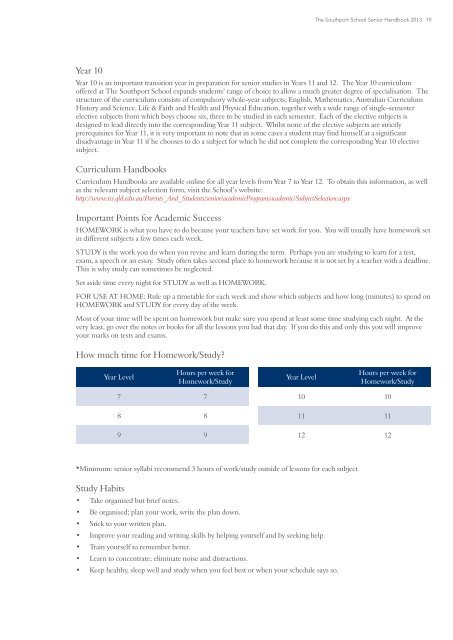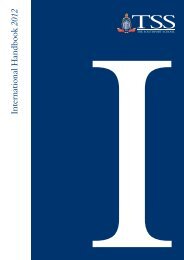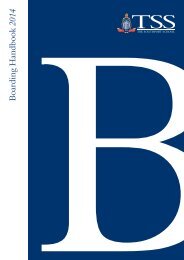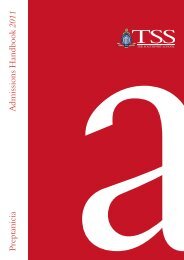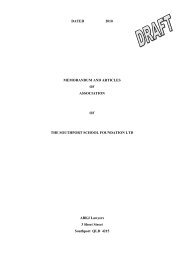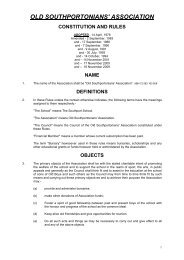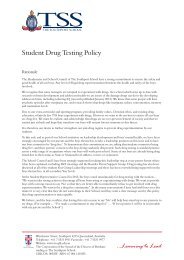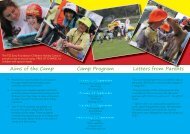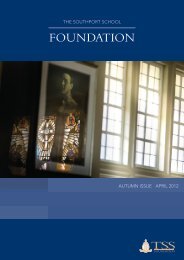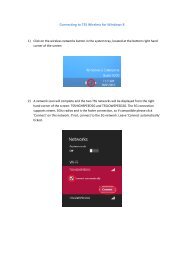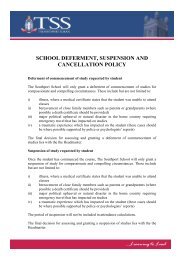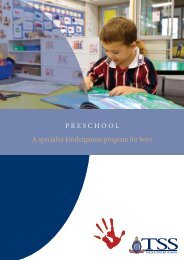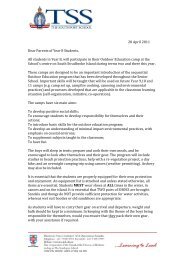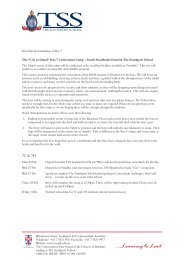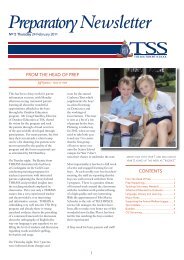2013 Senior Admissions Handbook - The Southport School
2013 Senior Admissions Handbook - The Southport School
2013 Senior Admissions Handbook - The Southport School
You also want an ePaper? Increase the reach of your titles
YUMPU automatically turns print PDFs into web optimized ePapers that Google loves.
<strong>The</strong> <strong>Southport</strong> <strong>School</strong> <strong>Senior</strong> <strong>Handbook</strong> <strong>2013</strong> 19<br />
Year 10<br />
Year 10 is an important transition year in preparation for senior studies in Years 11 and 12. <strong>The</strong> Year 10 curriculum<br />
offered at <strong>The</strong> <strong>Southport</strong> <strong>School</strong> expands students’ range of choice to allow a much greater degree of specialisation. <strong>The</strong><br />
structure of the curriculum consists of compulsory whole-year subjects; English, Mathematics, Australian Curriculum<br />
History and Science, Life & Faith and Health and Physical Education, together with a wide range of single-semester<br />
elective subjects from which boys choose six, three to be studied in each semester. Each of the elective subjects is<br />
designed to lead directly into the corresponding Year 11 subject. Whilst none of the elective subjects are strictly<br />
prerequisites for Year 11, it is very important to note that in some cases a student may find himself at a significant<br />
disadvantage in Year 11 if he chooses to do a subject for which he did not complete the corresponding Year 10 elective<br />
subject.<br />
Curriculum <strong>Handbook</strong>s<br />
Curriculum <strong>Handbook</strong>s are available online for all year levels from Year 7 to Year 12. To obtain this information, as well<br />
as the relevant subject selection form, visit the <strong>School</strong>’s website:<br />
http://www.tss.qld.edu.au/Parents_And_Students/senior/academicProgram/academic/SubjectSelection.aspx<br />
Important Points for Academic Success<br />
HOMEWORK is what you have to do because your teachers have set work for you. You will usually have homework set<br />
in different subjects a few times each week.<br />
STUDY is the work you do when you revise and learn during the term. Perhaps you are studying to learn for a test,<br />
exam, a speech or an essay. Study often takes second place to homework because it is not set by a teacher with a deadline.<br />
This is why study can sometimes be neglected.<br />
Set aside time every night for STUDY as well as HOMEWORK.<br />
FOR USE AT HOME: Rule up a timetable for each week and show which subjects and how long (minutes) to spend on<br />
HOMEWORK and STUDY for every day of the week.<br />
Most of your time will be spent on homework but make sure you spend at least some time studying each night. At the<br />
very least, go over the notes or books for all the lessons you had that day. If you do this and only this you will improve<br />
your marks on tests and exams.<br />
How much time for Homework/Study?<br />
Year Level<br />
Hours per week for<br />
Homework/Study<br />
Year Level<br />
Hours per week for<br />
Homework/Study<br />
7 7<br />
8 8<br />
9 9<br />
10 10<br />
11 11<br />
12 12<br />
*Minimum: senior syllabi recommend 3 hours of work/study outside of lessons for each subject<br />
Study Habits<br />
• Take organised but brief notes.<br />
• Be organised; plan your work, write the plan down.<br />
• Stick to your written plan.<br />
• Improve your reading and writing skills by helping yourself and by seeking help.<br />
• Train yourself to remember better.<br />
• Learn to concentrate; eliminate noise and distractions.<br />
• Keep healthy, sleep well and study when you feel best or when your schedule says so.


